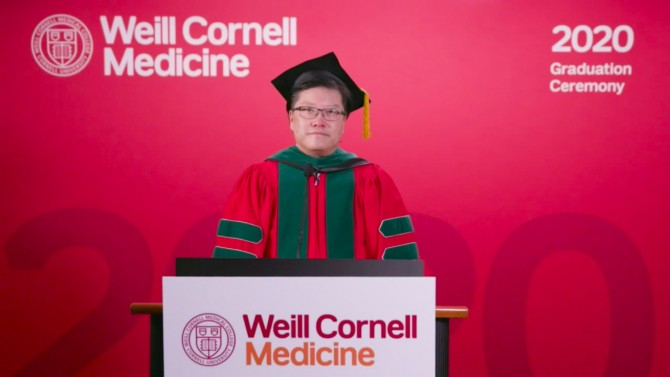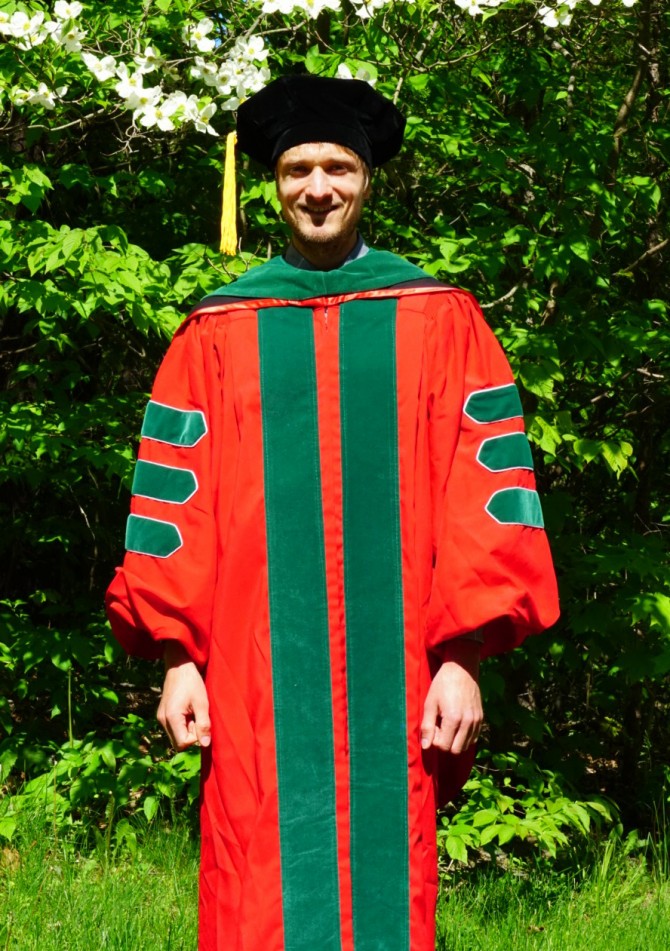
The Class of 2020 dons their caps and gowns as they celebrate during their commencement ceremony on May 28.
Weill Cornell Medicine celebrates with virtual Commencement
By Kathryn Inman
Like more than half of Weill Cornell Medicine’s Class of 2020, Dr. Kevin Ackerman chose to graduate early to be of service to New York City’s health care system during the COVID-19 pandemic. After the quick transition to working in the field in April, he relished the opportunity Commencement afforded him to mark the end of his medical education and reflect on why he chose medicine as his career.
“One of the core reasons I decided to go into medicine was a desire to help people and be of service to others, and I think that is a core value of people who choose to go into this field,” said Ackerman, who will be doing his residency in combined internal medicine and pediatrics at the University of Pennsylvania and the Children’s Hospital of Philadelphia. “For me, that aspect of medicine, of helping people in need, has only been magnified during this pandemic.”
He celebrated with his family in Hyde Park, New York, watching as the faces of his fellow graduates flashed across the screen and listening to remarks from medical college and university leadership, as well as student leaders, during Weill Cornell Medicine’s digital commencement ceremony May 28.
Ackerman was among 390 graduates – 109 fellow medical doctors, 68 Ph.D.s, 39 physician assistants and 174 with Master of Science degrees – in the Class of 2020. Cornell President Martha E. Pollack joined Deans Augustine M.K. Choi and Barbara Hempstead, and Dr. Yoon Kang, senior associate dean for medical education, in remotely conferring degrees on students graduating from Weill Cornell Medical College and Weill Cornell Graduate School of Medical Sciences.
In his address, Choi, the Stephen and Suzanne Weiss Dean of Weill Cornell Medicine and provost for medical affairs of Cornell University, noted the unprecedented nature of this year’s graduation, and the opportunity it will afford graduates to have a lasting impact on medicine.
“As graduates of Weill Cornell Medicine, you have the potential to transform medicine and science long after this pandemic has passed,” Choi said. “You’ve been trained in the distinctive culture of Weill Cornell Medicine – defined by the emphasis we place on academic excellence, independent thinking, collaboration and diversity. It’s in your DNA.
“Now I challenge you to build on what you’ve learned to define the new world we all find ourselves in. You are leaders and innovators, full of integrity and ingenuity. Never have we needed those more than now,” he said.
Weill Cornell Medicine–Qatar also celebrated its Class of 2020, 38 graduates in total, with an online commencement ceremony held May 6, when they received their medical degrees remotely from Dean Javaid I. Sheikh.
With their education complete, the 2020 graduates will now embark on their residencies, fellowships and postdoctoral research positions, and the next phases of their professional careers as physicians, scientists and health care leaders. They will do so in a landscape changed by the health care crisis, but with a foundation of academic excellence, said Pollack.
“As much as the pandemic has already defined the year of 2020, it will not define the Class of 2020,” Pollack said. “You are, and you always will be, defined by your excellence. By what you have learned and achieved during and before your time at Weill Cornell, and by everything you will do to care, to discover and to teach, throughout your careers.”
With those burgeoning careers comes great responsibility, and the important role graduates will have in communicating the value of science to society – particularly now, said Hempstead, dean of the Weill Cornell Graduate School of Medical Sciences.
“You are also critically important to our country because you have become proficient in science communication,” Hempstead said. “In these challenging times, we hope that you will put these skills to good use – to use data to drive decisions, to engage the community with language that connects us and enlightens us. Use your clarity of thought and scientific persuasion to encourage a broad set of viewpoints from diverse stakeholders.”
In a special address to the Class of 2020, Dr. Anthony Fauci, director of the National Institute of Allergy and Infectious Diseases and a graduate of the Weill Cornell Medical College Class of 1966, also emphasized the vital role graduates will play, in both science and medicine, as the world works to overcome the current health care crisis.
“The international medical community are the people rising daily to meet this challenge,” said Fauci, also one of the lead members of the White House Coronavirus Task Force addressing the COVID-19 pandemic. “And as newly minted graduates of Cornell, you will be leaders in this effort. Now more than ever, we need your talent, your energy, your resolve and your character.”
Dr. Pradeep Ambrose, the graduate school commencement speaker, said he hoped his fellow classmates will take the time to reflect on the moments of grace and kindness they experienced at Weill Cornell Medicine and the people they met along the way.
“I joined Weill Cornell for the superb research and academic environment, but as importantly, everyone I met embodied mentorship, academic rigor and kindness,” said Ambrose, who next will be attending the MBA program at Cornell’s SC Johnson Graduate School of Management, to better understand of the economics of health care. He encouraged fellow graduates to pay forward the commitment to mentoring that Weill Cornell Medicine’s culture embodies.
As the Class of 2020 moves to the next phase of their careers, medical school Commencement speaker Dr. Jason Silberman urged his fellow graduates to focus on what they have achieved over the past four years, rather than the bittersweet nature of the last few months.
“Despite the circumstances, we owe it to ourselves to be proud of just how long and how much we’ve worked since the time we decided to go to medical school. We did it,” said Silberman, who will soon begin his residency in obstetrics and gynecology at the Brigham and Women’s Hospital in Boston.
“It’s not the graduation day’s events that earn us our degrees. It’s everything we’ve done up to this point that has earned us our title, doctor,” he said. “Doctors, who will be entering the workforce in this particular moment in history with a tremendous opportunity to do good.”
Kathryn Inman is associate editor for Weill Cornell Medicine.
Media Contact
Get Cornell news delivered right to your inbox.
Subscribe


